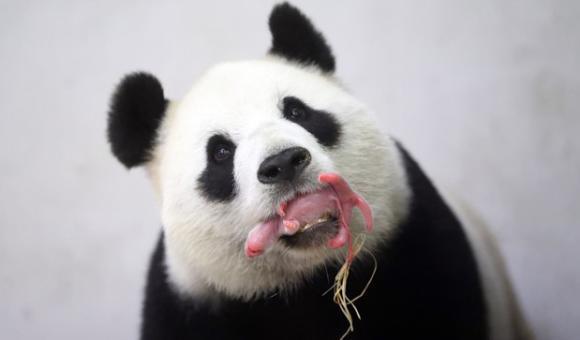A baby panda at Pairi Daiza! 13/06/2016
It's been expected for several months, despite the note of caution the Pairi Daiza Park included in its communication. But now it's official, the female giant panda, Hao Hao, has given birth to a male baby to the delight of the Park's managers and its visitors. He was born at 2.02 am and the cub weighed 171 grams. Mother and baby are doing well.
The Park announced the birth on social media: "Pairi Daiza and the China Conservation and Research Center for the Giant Panda have the great pleasure to announce the birth, last night, of a Giant Panda cub at Pairi Daiza."
-"Since his birth, Hao Hao has taken her baby in her mouth, a sign that she has accepted it", said Tim Bouts, Zoological Director of Pairi Daiza. "The baby has started to take milk from his mother. He has already taken his mother's colostrum twice, not naturally at first, for safety reasons. When he was born, he weighed 171 grams. He spends most of his time with his mother but is also regularly placed in an incubator. There is certainly still a period of risk of illness or problems with the milk, but our teams, supported by the Chinese experts, hope to control that."
The Park hasn't named the baby yet but has said that it will be given a Chinese name.
Patience required for visits
With this happy event, the Park, already popular with visitors should see even larger crowds rushing to see the newborn. However, patience will be the order of the day and no date has been given by Pairi Daiza as to when visits will begin. The situation will depend on how the baby's health progresses.
The newborn will return to China once he is 4 years old, in line with the agreement that the Park has with the country. The birth of a panda in captivity is rare, around thirty viable babies are born annually, which is 242 since 2008. According to Pairi Daiza's management, the birth of Hao Hao's baby is the world's first birth this year outside China. Threatened with extinction, there are currently no more than 2,000 giant pandas left on Earth. Every birth is therefore a real blessing for scientists and nature lovers. In 20 years, only two European countries – Austria and Spain –, with China's help, have seen successful with panda births in captivity. And, as of this morning, Belgium!
